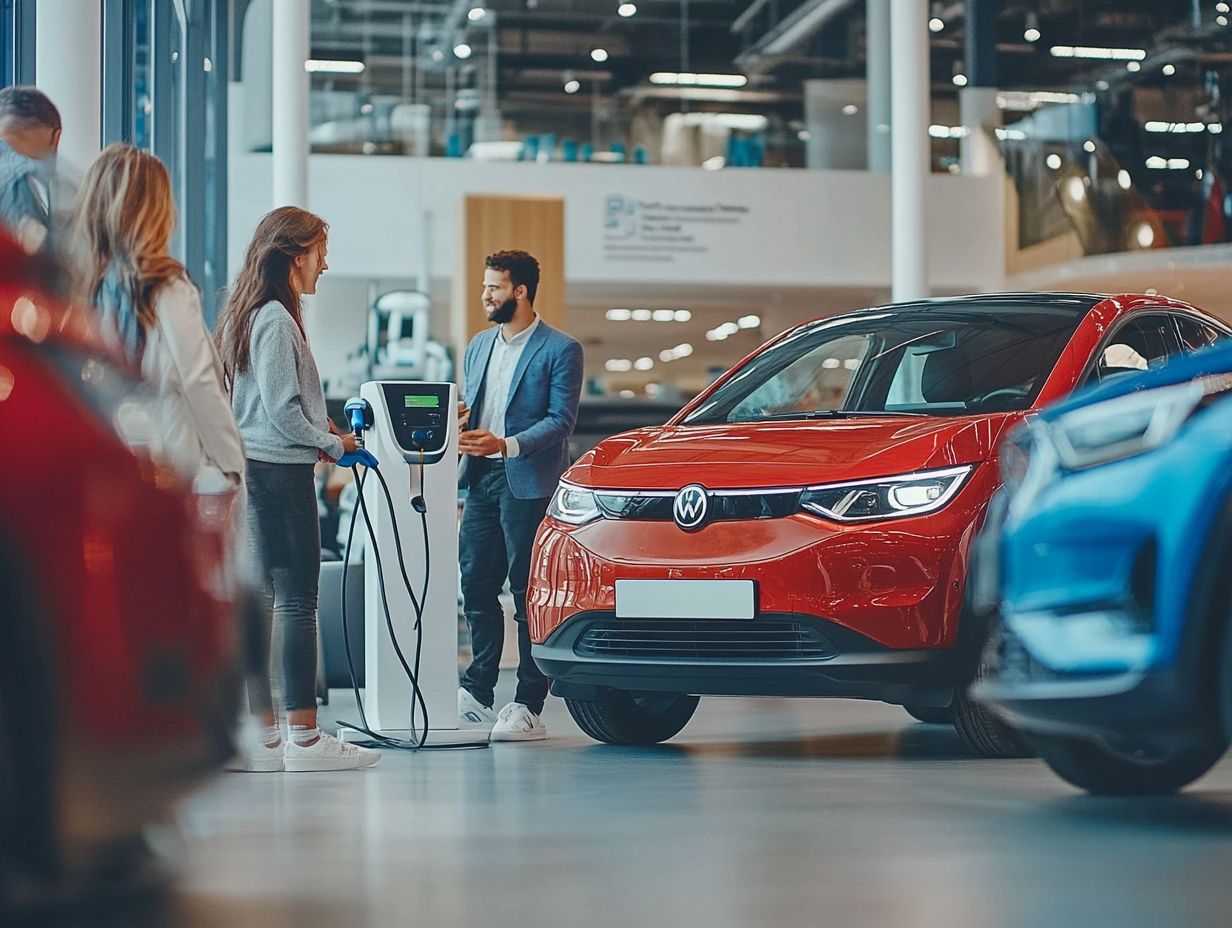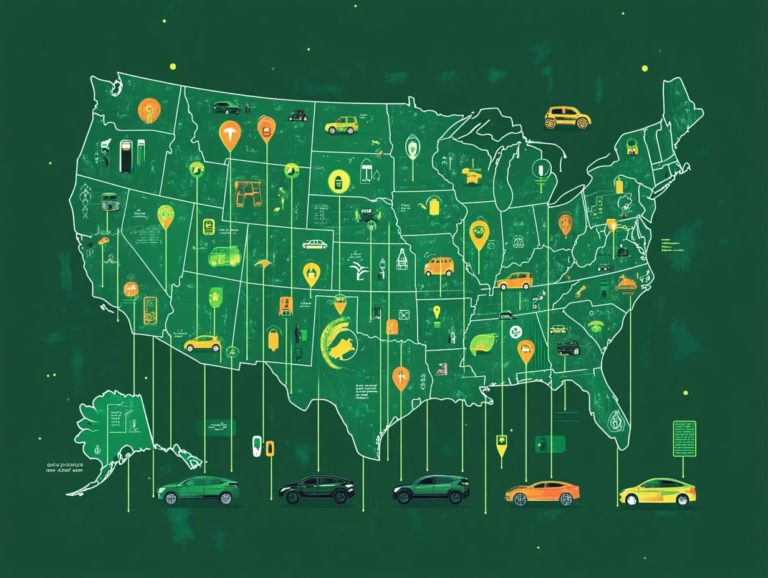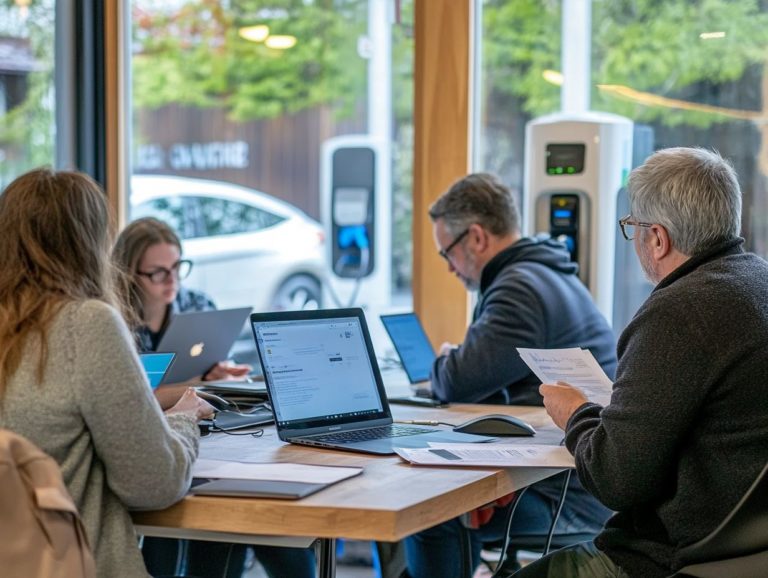ev rebates: what buyers should know
Electric vehicles (EVs) are quickly becoming the stars of the automotive world. With their rise comes a wealth of incentives designed to encourage your transition to electric driving.
One of the standout perks for buyers is the availability of EV rebates, which can significantly slash the overall cost of your new vehicle.
This article clarifies what EV rebates entail, delves into the various types available, and guides you through the eligibility criteria and application process.
You ll discover tips for maximizing your rebates, along with insights into other financial incentives that can make your shift to electric even more rewarding.
Whether you’re a first-time buyer or contemplating an upgrade, understanding these incentives equips you to make a more informed financial decision.
Contents
Key Takeaways:

EV rebates are financial incentives offered by the government to encourage the purchase of electric vehicles.
To qualify for EV rebates, buyers must meet specific criteria, such as maximum income limits and purchasing an eligible EV model.
Researching available incentives early can maximize your rebates, and considering additional financial benefits like tax credits can enhance your savings.
Understanding EV Rebates
Understanding EV rebates is crucial for you as a potential buyer of electric vehicles in North America. These top 10 EV rebates you should know about can significantly decrease the cost of acquiring a clean vehicle.
The federal tax credit can reach up to $7,500 and applies to various models from established manufacturers like Tesla and Chevrolet. Regulated by the IRS, this credit encourages the adoption of electric cars by making them more affordable while addressing a diverse market that includes plug-in hybrids and used electric vehicles.
However, vehicle eligibility hinges on factors such as maximum income limits and battery size. It s essential to grasp all the conditions before you apply, ensuring you maximize your benefits.
What are EV Rebates?
EV rebates are government incentives designed to encourage you to purchase electric vehicles by offering financial relief through federal tax credits and a range of other benefits.
These rebates can significantly lower the overall cost of your electric vehicle, making it more accessible to a broader audience.
Typically, you’ll go through an application process, which involves submitting documentation to verify your purchase. This can vary depending on your state and the specific program.
Along with substantial federal tax credits, many states and certain municipalities provide their own rebates or incentives.
These can manifest as direct cash-back offers, rebates on charging equipment, or exemptions from registration fees. Understanding how to maximize your EV rebates is crucial for you as a potential buyer looking to maximize your savings.
Types of EV Rebates Available
You ll find a variety of EV rebates at your disposal, including federal tax credits, state-level incentives, and utility company rebates that aim to encourage the adoption of clean vehicles.
These rebates can significantly reduce the overall cost of purchasing electric vehicles, allowing you to embrace a greener choice while enjoying impressive financial savings. The specifics can vary widely depending on your state and the utility company involved.
For example, if you re in California, you might benefit from generous rebates for models like the Volkswagen ID.4, while options in other states could be more favorable for vehicles such as the Chrysler Pacifica.
It s essential to dive deep into all available options to maximize your potential savings and make informed decisions when considering an electric vehicle purchase.
Eligibility for EV Rebates

Eligibility for EV rebates hinges on various criteria you must meet as a potential buyer. This includes vehicle qualifications based on model year, battery size, and maximum income limits established by the IRS. For a deeper insight, consider understanding the process for EV rebates, particularly regarding modified adjusted gross income calculations.
Don’t miss out on these savings! Start your electric vehicle journey today and reap the rewards!
Qualifying Criteria
The qualifying criteria for EV rebates include certain requirements, such as the vehicle identification number (VIN), which must match models that meet the federal tax credit guidelines.
You also need to check income limits based on modified income after adjustments. To determine your eligibility, you can use the VIN to verify whether your model is on the approved list, ensuring you re ready to receive the full credit.
It s essential to be mindful of the income thresholds. Many programs use modified income after adjustments to set these limits, which can differ from your regular adjusted gross income due to certain deductions or exclusions.
Understanding these details helps you know your eligibility and plan your finances as you consider purchasing an electric vehicle.
How to Apply for EV Rebates
Ready to dive into the world of EV rebates? The application process is quite straightforward! Simply complete the necessary IRS tax credit forms, especially IRS Form 8936, which is used to claim your tax credit as a rebate on your tax returns.
This small step not only benefits you financially but also contributes to the growth of the electric vehicle market.
Step-by-Step Guide
The guide to applying for EV rebates is designed to empower you as you navigate the application process. It begins with verifying vehicle eligibility and ends with submitting IRS Form 8936 for tax credits.
This approach ensures you can confidently progress through each phase without missing crucial details. Start by verifying that your chosen electric vehicle meets the specific criteria established by local and federal regulations, which may include factors like battery capacity and the vehicle’s make and model.
Once you ve confirmed eligibility, the next step is to gather necessary documentation, including proof of purchase and the vehicle s VIN. It’s also important to keep track of submission deadlines to ensure you don t miss out on potential savings.
Being mindful of common pitfalls such as errors in form completion or documentation delays can significantly enhance your chances of securing those valuable rebates.
Maximizing EV Rebates

To maximize EV rebates, engage in strategic planning and gain a thorough understanding of the various government incentives available to electric vehicle buyers.
This knowledge empowers you to get the best value from your electric vehicle investment.
Tips for Getting the Most Out of Your Rebates
To truly maximize your EV rebates, consider these strategic tips:
- Purchase eligible models.
- Familiarize yourself with local government incentives.
- Leverage federal tax credits to optimize your savings.
It s essential to conduct thorough research on different models, as rebate eligibility can differ significantly. For instance, some electric vehicles offer more generous incentives than others, depending on their specifications and the manufacturer.
Staying vigilant about the evolving electric vehicle market is equally important; changes in legislation or the introduction of new models can greatly influence the rebates and tax credits available to you.
By keeping informed and timing your purchase wisely, you can fully capitalize on the financial incentives in this rapidly shifting landscape.
Other Financial Incentives for EV Buyers
Beyond EV rebates, you’ll discover an array of financial incentives available to electric vehicle buyers. These include various tax credits and government programs, along with important details on rebates for charging stations, meticulously crafted to foster growth within the electric vehicle market.
Tax Credits and Benefits
Tax credits and benefits can significantly lower your costs. This makes switching to electric vehicles an appealing choice.
Alongside the federal tax credit, many states offer their own incentives rebates, tax exemptions, or special access to carpool lanes. These incentives make the transition to electric vehicles even more enticing.
A state credit can seamlessly complement the federal initiative, effectively reducing your purchase price and enhancing affordability. These programs aim to encourage environmentally conscious choices while fostering economic growth through green technology.
The unique synergy of federal and state programs maximizes your savings and positions owning an electric vehicle as an attractive investment. It cuts down both upfront costs and long-term expenses like fuel and maintenance.
Frequently Asked Questions

What are EV rebates and why should buyers be aware of them?
EV rebates are money-saving incentives offered by governments and manufacturers to encourage the purchase of electric vehicles. Buyers should be aware of what you need to know about EV purchase rebates as they can significantly lower the cost of an EV and make it more affordable.
Who is eligible for EV rebates?
Eligibility for EV rebates varies by location and program. Generally, rebates are available to individuals and businesses purchasing or leasing a new electric vehicle. Some programs also have income or residency requirements.
How much money can buyers save with EV rebates?
The amount of savings from EV rebates depends on the program. In some cases, buyers can save up to $10,000 or more. However, the exact amount varies based on the type of vehicle, its battery size, and the buyer’s location.
Are there any restrictions on which EVs are eligible for rebates?
Yes, some EV rebates only apply to certain types of vehicles, such as all-electric or plug-in hybrid models. The vehicle may also need to meet specific emissions and fuel economy standards to qualify for the rebate.
Do EV rebates expire?
Yes, EV rebate programs often have expiration dates or funding limits. It’s important for buyers to check the program details and learn how to leverage EV rebates for savings before the deadline to ensure they can take advantage of the savings.
Are there any other benefits to purchasing an EV besides rebates?
Yes, besides the potential financial savings from rebates, driving an EV can also save money on fuel and maintenance costs. Electric vehicles are also better for the environment and can help reduce carbon emissions.
Don’t miss out on these fantastic savings! Explore local rebate options or contact local dealers for more information.






